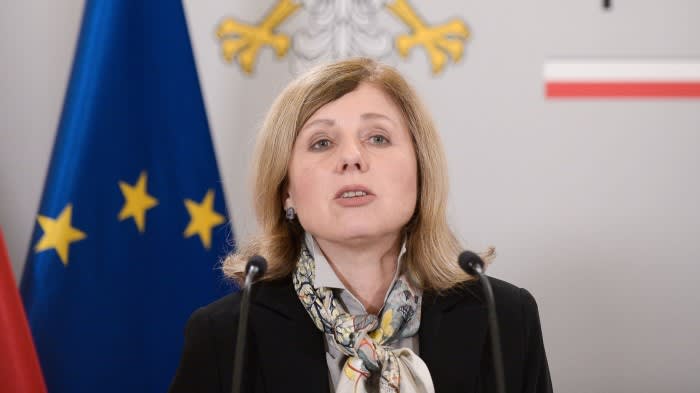Unlock the Editor’s Digest for free
Roula Khalaf, Editor of the FT, selects her favourite stories in this weekly newsletter.
The European Commission is urging Google and other big technology companies to help dissident Belarusian media by promoting their stories higher than those published by pro-regime outlets, which opposition journalists argue are favoured by search algorithms.
Belarusian journalists in exile have complained to the commission that content critical of the regime of Alexander Lukashenko is failing to reach target audiences, in part because of search algorithms used by Google, Meta and others, which they claim wrongfully take into account Lukashenko’s media censorship rules.
“Fighting disinformation and promoting media freedom are two sides of the same coin — and we want Big Tech to do both,” European Commission vice-president Věra Jourová told the Financial Times.
“This means ensuring the visibility of trustworthy information online, not the propaganda of Minsk or the Kremlin,” she added, criticising platforms for disseminating propaganda from Belarus and Russia, its close ally.
Belarusian journalists have also warned that the situation is worsened because Google News is not available in the Belarusian language, limiting what the country’s readers can find online. The EU exempted state media from the sanctions drawn up against Belarus in the aftermath of Russia’s invasion of Ukraine in 2022, in contrast to the bans placed on Russian news sites.
Lukashenko relies on Vladimir Putin as a defence patron and backstop for his grip on power. He called on the Russian president to help with a brutal crackdown on demonstrators following his re-election in 2020 that western governments condemned as fraudulent.
Putin subsequently used Belarus as a launch pad to attack Kyiv in February 2022, extracted Lukashenko’s approval to station Russian tactical nuclear weapons and used him as mediator and host for rebellious Wagner fighters after the aborted mutiny of their warlord, Yevgeny Prigozhin, in June 2023.
Jourová, whose EU portfolio includes the rule of law, raised her concerns about Belarus in December with Google’s president of global affairs, Kent Walker, according to people familiar with the matter. In May, she also discussed similar issues with Google chief executive Sundar Pichai, focusing more on Russia and problems such as the inability of that country’s independent media to monetise content posted on YouTube in Russia.
“There are laws and initiatives in the EU to make sure that online platforms are doing the right thing,” Jourová said. But officials in Brussels also acknowledge that there are no grounds to fine or start legal proceedings against technology companies for not helping dissident journalists and writers from Belarus or other non-EU nations in their fight against authoritarian regimes.
Google said in response that “we go to great lengths to build our products and enforce our policies in ways that don’t take political leanings into account”. Searches can “always be better”, the company added, but cautioned that there are “hundreds of factors that determine which results are shown”.
Meta did not respond to a request for comment.
However, journalists who oppose Lukashenko insist that there are concrete steps Google could take to remove hurdles, including by adding Belarusian to the 40 or so languages already used by its news service.
“The Belarusian case is probably not unique, but it is one of the first when western technology companies like Google and Meta have become tools for a totalitarian and authoritarian regime to put pressure on civil society instead of helping to promote independent media,” said Natalia Belikova, who heads the Press Club Belarus, a Warsaw-based association of journalists who have been working outside their country since the media crackdown began in 2020.
Juozas Olekas, a Lithuanian MEP who chairs the European parliament’s delegation for relations with Belarus, said that so far “Big Tech didn’t show any willingness or interest to address this problem”.
He pointed out that banned media is treated by Google’s algorithms as a “broken link” and downgraded in search results in Belarus as an example of how technology companies inadvertently aid Lukashenko.
“After some time all independent media channels are at the very back of the news feeds,” Olekas said, while “the top news are dominated by Lukashenko’s media and Russian media channels”.

